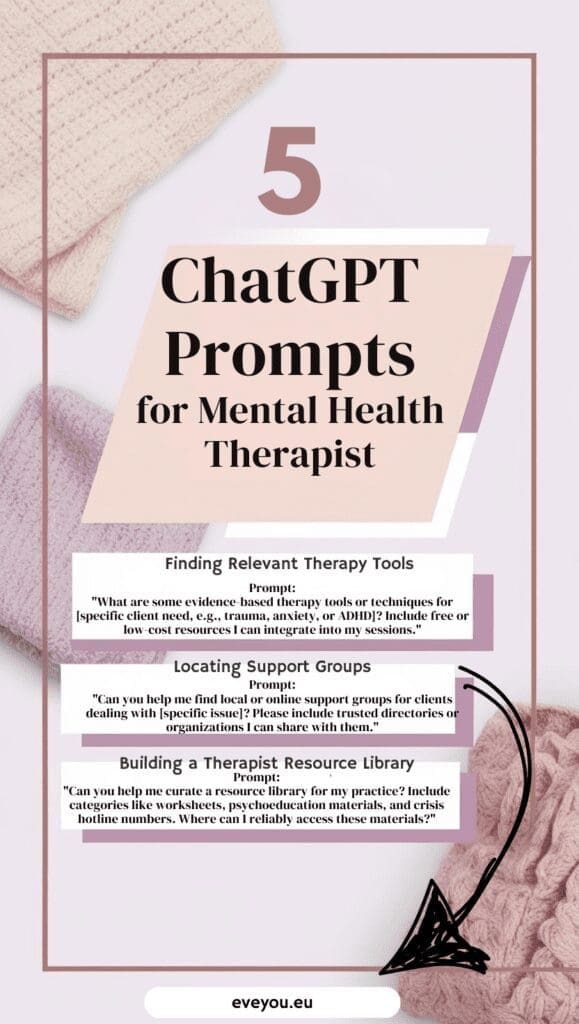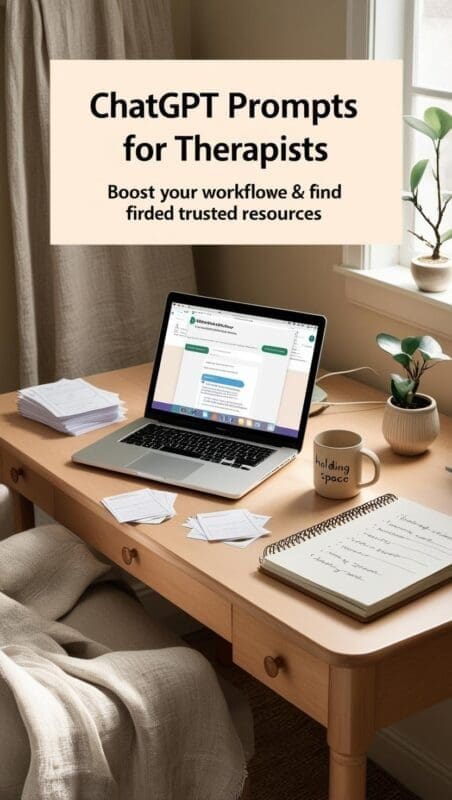Introduction: Integrating ChatGPT into Mental Health Practice
As mental health professionals, we’re constantly seeking ways to stay informed, manage time effectively, and support our clients with up-to-date resources. But with overflowing inboxes and emotionally demanding workloads, there’s often little energy left for research and content creation.
That’s where AI tools like ChatGPT can help.
When used ethically and thoughtfully, ChatGPT can support therapists in finding educational resources, generating psychoeducational content, organizing treatment materials, and even planning blog posts or handouts—without replacing clinical judgment.
In this article, I’m sharing a list of practical, therapist-approved ChatGPT prompts designed to help you save time, stay organized, and support your clinical work more efficiently. Whether you’re a school counselor, private practice therapist, or mental health advocate, these prompts are a starting point for using AI in a way that feels intentional, ethical, and helpful.

Crafting Effective Prompts: Best Practices
1. Finding Relevant Therapy Tools
As therapists, we’re constantly seeking effective tools to meet our clients’ evolving needs—but between back-to-back sessions and limited budgets, it’s not always easy to find the right resources. This prompt helps you quickly gather evidence-based tools tailored to specific client presentations like trauma, anxiety, or ADHD—without spending hours searching.
Prompt to Try:
“What are some evidence-based therapy tools or techniques for [specific client need, e.g., trauma, anxiety, or ADHD]? Include free or low-cost resources I can integrate into my sessions.”
Why It Works:
By focusing the prompt on both the clinical issue and budget-friendly solutions, ChatGPT can deliver practical resources you can immediately use in session or share with clients. It’s an excellent shortcut for discovering handouts, apps, or worksheets that align with your therapeutic approach—whether that’s CBT, DBT, mindfulness-based work, or client-led exploration.
Example Results Might Include:
- Trauma: Free grounding technique worksheets from reputable trauma-focused sites
- Anxiety: CBT-based tools like the MindShift app for emotion tracking and thought reframing
- ADHD: Visual time management tools such as Time Timer or printable executive function charts
2. Locating Support Groups
Therapeutic progress doesn’t end when the session does—and sometimes, the most powerful support clients receive is from others who’ve walked a similar path. Whether you’re helping someone navigate grief, addiction, or postpartum depression, this prompt allows you to quickly identify trusted support group options you can share confidently.
Prompt to Try:
“Can you help me find local or online support groups for clients dealing with [specific issue, e.g., grief, addiction, or postpartum depression]? Please include trusted directories or organizations I can share with them.”
Why It Works:
This prompt taps into ChatGPT’s ability to search and summarize relevant resources from directories, nonprofit organizations, and mental health networks. It’s especially helpful when you’re short on time but want to provide clients with safe, reputable, and accessible options—either in their local area or online.
Example Results Might Include:
- Addiction: Local AA/NA meetings, or virtual SMART Recovery groups for a non-12-step approach
- Postpartum Depression: Online and in-person groups hosted by Postpartum Support International
- Grief: GriefShare sessions available virtually or through nearby community centers and churches
3. Sourcing Self-Help Materials for Clients
Sometimes the most meaningful progress happens between sessions—and having the right self-help resources can empower clients to deepen their insights and build new skills on their own time. This prompt helps you find well-curated books, podcasts, and apps that align with your client’s goals—without having to read endless reviews yourself.
Prompt to Try:
“What are the best self-help books, podcasts, or apps I can recommend to clients working on [specific goal, e.g., mindfulness, self-esteem, or emotion regulation]? Include brief descriptions and why they might be helpful.”
Why It Works:
This prompt combines convenience with clinical relevance. You’ll get a short list of trusted resources plus a quick explanation of how each can support the client’s therapeutic goals. It’s a great way to supplement your work with client-directed materials—especially for those who enjoy learning outside the therapy room.
Example Results Might Include:
- Mindfulness: The Miracle of Mindfulness by Thich Nhat Hanh – A gentle introduction to present-moment awareness through everyday tasks
- Self-Esteem: The Self-Esteem Workbook by Glenn R. Schiraldi – Structured exercises rooted in cognitive behavioral principles
- Emotion Regulation: MoodMission app – Helps users identify what they’re feeling and choose coping strategies in the moment
4. Discovering Professional Development Opportunities
Continuing education is essential for staying grounded in best practices, exploring new modalities, and deepening your therapeutic skillset. But finding reliable, affordable professional development can be time-consuming. This prompt helps you uncover upcoming trainings, workshops, or certifications specific to your niche—so you can grow without breaking your budget.
Prompt to Try:
“What are some upcoming workshops, certifications, or webinars for therapists specializing in [specific therapy approach, e.g., CBT, DBT, or EMDR]? Focus on affordable or free options if possible.”
Why It Works:
This prompt taps into current listings, allowing you to stay informed about new opportunities in your specialty area. Whether you’re searching for no-cost webinars, CE-eligible intensives, or practical certification programs, ChatGPT can help you identify offerings that match your interests, schedule, and budget.
Example Results Might Include:
- CBT: Free live or recorded webinars hosted by the Beck Institute, often CEU-eligible
- DBT: “DBT in Practice” training series, available online with sliding-scale or tiered pricing
- EMDR: Foundational workshops from EMDRIA that offer introductory-level training and certification pathways
5. Building a Therapist Resource Library
Having an organized, go-to library of handouts, worksheets, and hotline information can make your sessions more impactful—and your workday smoother. Whether you’re supporting clients through depression, parenting challenges, or stress regulation, this prompt helps you build a well-rounded library of trustworthy materials.
Prompt to Try:
“Can you help me curate a resource library for my practice? Include categories like worksheets, psychoeducation materials, and crisis hotline numbers, focusing on topics such as [e.g., coping skills, depression, or parenting support]. Where can I reliably access these materials?”
Why It Works:
This prompt creates structure around a task that many therapists push off due to time constraints. Instead of endlessly Googling, ChatGPT can provide a categorized, therapist-relevant list of resources from reputable organizations. You’ll walk away with printable tools, websites for ongoing support, and information you can keep in your client folders or share via email.
Example Results Might Include:
6. ChatGPT Prompts for Creating an Online Community or Course for Therapists
As more therapists explore digital offerings—whether it’s launching an online course, building a peer support space, or starting a Substack newsletter—ChatGPT can help you brainstorm ideas, structure content, and even fine-tune your messaging.
If you’re a counselor looking to support other professionals through education, coaching, or community, here are some powerful prompt ideas:
🎯 Online Course Development Prompts
- “Create an outline for an online course for therapists on managing burnout and setting boundaries in private practice.”
- “List 10 engaging video module ideas for a course on trauma-informed care for early-career therapists.”
- “Write a promotional landing page for my course about nervous system regulation for therapists.”
- “Suggest interactive activities for an online group course for school counselors on behavior interventions.”
💬 Online Community Building Prompts
- “Brainstorm names for a supportive online community for therapists who work remotely.”
- “Generate a month of weekly discussion topics for a Facebook group for mental health professionals.”
- “Create an onboarding welcome email for new members joining a therapist peer support community.”
- “Write a group description for a Slack or Circle community for therapists building passive income streams.”
✨ Therapist Voice Tip:
If you’re building a course or space for peers, try prompting ChatGPT to write in your unique voice. For example:
“Rewrite this welcome message to sound warm, inclusive, and supportive—like a therapist speaking to other therapists.”
Ethical Considerations and Limitations
While ChatGPT and other AI tools offer incredible support for mental health professionals, it’s essential to approach their use with ethical awareness and clinical judgment. These tools are meant to assist therapists—not replace them—and must always be integrated in ways that uphold client safety, privacy, and therapeutic integrity.
⚖️ Confidentiality Comes First
Never input any identifiable client information—names, case notes, or session details—into ChatGPT or any AI system. Even anonymized data carries a risk if it includes enough specific context. Protecting client confidentiality is a core ethical responsibility and must always override convenience.
Tip: Use AI tools to draft or brainstorm with fictional case examples, not real client scenarios.
🧠 Human Insight Over Machine Output
AI can provide fast summaries, general resources, or psychoeducational materials—but it lacks the emotional intelligence and nuance of a trained therapist. Use ChatGPT to complement your expertise, not to replace clinical decision-making.
- Don’t use AI to diagnose.
- Don’t rely on AI for treatment planning.
- Always verify and critically evaluate information before using it in practice.
🔍 Bias, Misinformation & Inaccuracy
While ChatGPT is trained on a wide range of content, it can still generate biased, outdated, or inaccurate responses. Therapists must be vigilant about cross-checking AI-generated content against current evidence-based research and ethical guidelines.
Example: A prompt asking for grounding techniques may return general advice not suitable for trauma-informed care unless specifically guided.
👩⚖️ Follow Your Professional Guidelines
Refer to your licensing board, national association (e.g., ACA, APA, NASW), or workplace policies when using AI. Many of these bodies are still updating their recommendations around digital tools, and staying informed will help you use AI responsibly.
Thoughtful Use of AI in a Human-Centered Field
ChatGPT isn’t here to replace the intuition, empathy, or training that defines good therapy—but it can be a supportive tool in the background. Used wisely, these prompts can help mental health professionals access ideas, brainstorm resources, and bring fresh structure to their therapeutic practice.
Explore more ways to support your work as a therapist:
If you found these prompts helpful, save this article or share it with a colleague. And if you’ve created something meaningful using ChatGPT in your work—I’d love to hear about it!


About the Author
Hi, I’m Eve, a former school counselor with a master’s degree in School Psychology and a passionate advocate for children and families navigating sensory challenges. As a mom of children with sensory sensitivities, I deeply understand the journey special-needs parents face, and I dedicate myself to researching and sharing practical solutions to help children thrive and feel comfortable in their bodies. My goal is also to empower counselors, therapists, and psychologists with creative strategies and supportive resources to enrich their everyday practice. When I’m not writing or exploring new therapeutic approaches, you’ll find me spending quality time with my family and continually seeking inspiration from everyday moments.
